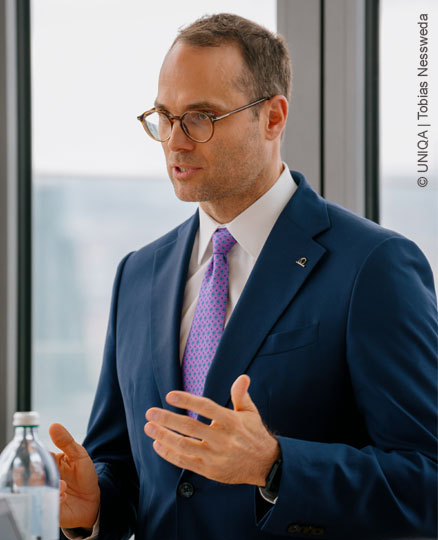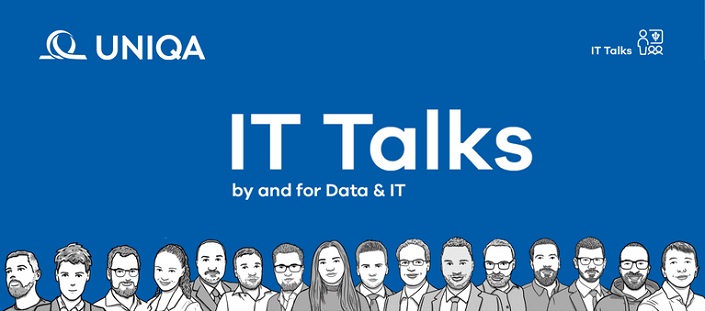
A successful career with an apprenticeship
Read interview



Adults must find their way and take responsibility for themselves and their financial future. However, a lack of financial literacy, inflation, and a volatile interest rate environment pose challenges for many. The constantly growing pension gap makes individual pension provision a necessity even for young people.
What are Austria's attitudes, measures, and barriers to financial provision? We have asked these questions for the fourth time this year in the UNIQA Financial Provision Study 2024. In the representative study for Austria, conducted by the market research institute Reppublika Research & Analytics, 3,207 people between the ages of 16 and 60 and an additional 220 people between the ages of 18 and 29 were surveyed (26 April - 3 June 2024).
How is the financial health of young adults in Austria? How are they dealing with financial responsibilities, and can they finance their own lives independently? In 2024, a particular focus was placed on "growing up" in connection with financial responsibility and provision and on the target group of young adults aged 18 to 29. We also analysed changes to the years 2021-2023.
The age of majority in Austria is 18, but when do Austrians actually feel like adults? Just under half of young people aged 18 to 29 say that they are financially independent or have moved out of their parents' home. A good third cite starting a career, while a fifth cite owning their own house or flat as a milestone. Marriage, on the other hand, is only a milestone for one in ten young people. Regardless of their age, women (53% vs. men 43%) and financial independence are even more important for growing up than men (women 47%, men 42%).
For more than two-thirds of people living in Austria, young people are also considered financially mature if they can pay for their own housing, food, mobility, and other (fixed) expenses without regular financial support from parents or other people. This aspect is essential to women: almost three-quarters agree with this, while only less than two-thirds of the men surveyed are of this opinion. In contrast, almost half of men consider full-time employment one of the most important signs of financial independence, but only a third of women do. In turn, they attach more importance to not going into debt for leisure goods (such as clothing, electronics, or traveling) (women 47%, men 42%).
"Young adults have their lives ahead of them, the world is open to them - and they must and should find their own way. And regardless of when young people actually feel like adults: The earlier you take responsibility for your financial future, the better! We want to raise awareness of this at an early stage, encourage them and support them in doing so," emphasises René Knapp, UNIQA Management Board member responsible for personal insurance, at the presentation of the annual study.
René Knapp
Three-quarters of 18 to 29-year-olds earn an income from a job, while 20% receive regular financial support from their parents. Four out of ten young adults state that they believe they are able to finance their lives entirely themselves. A third group says that they can primarily finance their own lives themselves. Only just under a tenth of respondents in the young age group are unable to finance their own lives at all, while a fifth state that this is only partly possible.
Almost two-thirds of the young adults surveyed feel (very) confident about keeping track of their finances and making necessary payments on time. This is particularly true for young women, with seven out of ten respondents stating this (vs. 6 out of 10 men). When assessing and comparing financial offers, however, the figure drops to around a third - here, young men (39%) feel more confident than young women (30%).
The three greatest wishes of the 16 to 60-year-olds surveyed for the future in terms of material or financial matters are a debt-free life (50%), to be able to maintain their current standard of living (43%) and to be able to go on many holidays or trips (35%).
A debt-free life is also the number one priority for young adults (43%). However, they also want enough money to support their family (36%). Holidays and travel are also trendy (35%) and owning a house with a garden in the countryside (34%). Only under one in ten young people would like luxury items such as luxury clothing, accessories, or expensive jewelry, and young women tend to be even less likely (7% vs. 10% of young men).
Financial provision is still considered very important in 2024. As of 2023, this is important to seven out of ten 16 to 60-year-olds. Four out of ten have also looked closely at their financial provision. Compared to the previous year, there has been a visible increase among both men and women and in the young target group, with men stating that they have already dealt with the topic more intensively than women.
The proportion of people who have already taken concrete measures for their financial provision has also risen slightly (from 37% to 40%), particularly among men (40% to 45%). More than a quarter (29%) of those surveyed still state they have too little money for financial provision. However, this figure is trending downwards (2024: 34%). Although this trend is evident among men and women, women are significantly more likely to say they have too little money for financial provision (34% vs. 25% of men).
"The study clearly shows that women face particular challenges in the financial provision. The fact that women more frequently state that they cannot make adequate provisions is closely linked to existing income inequality. Women's lower average income than men inevitably leads to less financial scope for long-term provision. This underlines the need both to close the pay gap and to promote targeted financial education measures for women in order to improve their opportunities for retirement provision," says Professor Bettina Fuhrmann, Head of the Institute of Business Education and the Centre for Financial Education at the Vienna University of Economics and Business, interpreting the results.
Bettina Fuhrmann
Only around a quarter of Austrians of all age groups rate their knowledge of financial and investment topics as (relatively) high. The proportion has risen slightly compared to the previous year, although the increase is mainly attributable to men. More than twice as many men (32%) as women (15%) rate their knowledge as (relatively) high. Conversely, 35% of women, but only 22% of men, rate their knowledge as (relatively) low.
We can see that the awareness-raising efforts of recent years are having an effect, albeit not overnight. This is why the initiatives of the public sector, the school system, and not least the financial sector's contributions are so important and must be continued intensively.
Read interview
Read article
Read article



